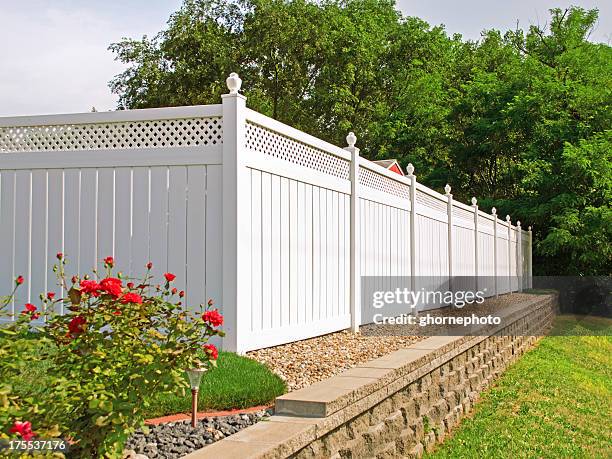About Fences

On my way back home from running an errand not long ago, I saw a fence where I hadn’t seen one before. Curious Kate that I am, I started looking around as I drove and saw that there were quite a few fences already ensconced in our neighborhood. I knew that a number of the barriers had gone up around backyards and sideyards, but I had suddenly become aware of seeing some new ones, a few of them running the length of the sideyards. Thankfully, none of them are across the front. There’s still the clear space of lawns. We don’t have deer here in this neighborhood as we did where I lived in Maryland, and the critters would come in the night and eat up my tomato plants, even the salvia and other flowers in the little garden I was trying to grow. I didn’t put up a fence though. Nobody else had one. So why these fences here, I wondered.
To me, the fences beg for an explanation, which I don’t have, and I haven’t asked for one, despite my curiosity. But it sometimes happens that an enterprising salesman comes around and sells a few homeowners on buying things they don’t need, as happened when one outfit came selling house numbers on the concrete at the edge of our driveways. A few people actually did go along with the idea, even though they already had the numbers on their mailboxes.
At the mention of fences, some of you may think of August Wilson’s powerful, award-winning play Fences, but as I chewed on the idea of a reason for the neighborhood fences, my thoughts led me to Robert Frost’s poem “Mending Walls.”
The first line of the poem says, “Something there is that doesn’t like a wall.” Quite an arresting beginning for a poem, one that prods you to think in a critical way. Well, I would say there’s something that doesn’t like a fence, something like an innate sense of community that a fence pushes against. In the poem, an old New England farmer is out in early spring reluctantly helping his neighbor rebuild the wall between their properties after winter weather had loosened some stones and pieces of wood. The speaker in the poem doesn’t think it necessary to have a wall between them and says so. His neighbor, bent on the repair job, says, “Good fences make good neighbors.” A little reasoning doesn’t deter the fence-builder because, as if he hadn’t heard a word his companion was sayng, he repeats his opinion that “good fences make good neighbors.” This little scene is so familiar. Some people don’t analyze their reasons for their beliefs and actions. They just know it’s the ways they see things, the way they’ve always done. No need to change. Well-reasoned arguments don’t move them. What’s that old adage? “A man convinced against his will is of the same opinion still.” The old farmer’s neighbor belongs to that club.
After a while, the farmer-speaker makes what I consider the crucial point of the poem when he says, somewhat in a tone of obvious reuke:
“Before I built a wall, I’d ask to know
What I was walling in or walling out
And to whom I’d like to give offense.”
There’s a world of thought in these few lines. Some people build a fence to keep other people out—out of their intimacy, out of their inner feelings, out of their private space. And they have the freedom and right to do just that, but what are they missing by erecting the fence? They actually fence themsleves in when they decide whom to wall out or wall in. Yes, they’re free to do whatever they please, but is their freedom inclusive or exclusive? Are some people welcome beyond the fence while others are not?
On the other hand, there are those who try to wall in other people, putting constraints on their freedom. It happens in any number of social situations–in families with children, in marriages, churches, and clubs. Is this kind of fencing selfish, or is it protective, or both? Viewed in a metaphorical sense, fences are about relationships and can have multi-layered meanings. Borders, walls, fences shape and influence human interactions. Putting up a fence, whether physical or metaphorical, can injure otherwise harmonious relationships. We should take the old farmer’s words seriously and consider to whom we’d likely give offense by erecting our fence. If we examine them, we’ll find that most times our fences aren’t necessary.
Navigating life with our fellow beings can sometimes be challenging, and some of us may think that the best way to deal with the situation is to put up a fence. But in a singular way, by raising our sights above our perceived problem, we can find a solution to any desire we may have to erect a fence. Instead, we can try to foster community by making an effort to be open and welcoming. Jesus said, “If I be lifted up, I will draw all men [and women] to me” (John 12:32). The centrality of His presence in our lives can make all the difference. No barrier, no wall. Just walk right into His unconditional acceptance, and then extend the experience to others.
Blessings,
Judith
~~~~~~~~~~~~~~~~~~~~~~~
“Love recognizes no barriers.
It jumps hurdles, leaps fences,
penetrates walls
to arrive at its destination
full of hope.”
Maya Angelou
*****************************************************************
———————————————————————————–
Hello All,
Here is a flyer I prepared to publicize my books. It has received
very positive responses. I hope you will share it with your friends
and family. I’m sure there’s something here that you can recommend.
Thanks. JN
4 Comments
Fartema M Fagin
Juneteenth, July 4th, thoughts about Freedom. Some recognizable quotes, “Build that wall!” “Free at Last, free at last, thank God almighty. I’m free at last!”
‘About Fences’ hit close to home for me because in my newly developed community I’ve noticed many neighbors have added fences. I’ve questioned whether I should do the same. My neighbors to the right and left of my home have added fences. They both have dogs. I don’t have a dog. Other neighbors have small children. I don’t have small children.
Some call them ‘privacy fences’.
There was a recent neighborhood Facebook posting that warned of a bobcat roaming the neighborhood.
While sitting in my backyard a few days ago, soaking up natural vitamin D, I noticed a pair of ears in the bush that separates my backyard from the complex behind me. Fear came upon me. I retreated indoors. A few minutes later a large cat emerged from the brush. I laughed at my own self. False fear alert.
Should I get a fence too? I like the song, ‘Jesus, be a fence all around me.’
Judith Nembhard
Hi Fartema,
So much here in your comment, even a little humor picturing you retreating indoors from the imagined bobcat.
There’s something about a fence, isn’t there? It sends a message. Sometimes a useful and understandable one,
but at times it is negative. As you said, the fences have been called “privacy fences.” That says a whole
lot right there. I just know I haven’t warmed to the ones I have noticed in my neighborhood. By the way, the
song “Jesus, Be a Fence Around Me” by the Soul Stirres is a favorite of mine. Happy Fourth! JN
Orville N Harris
Thank you Dr Judith.. I enjoy your writing very much. As a former schoolmate, i am immensely proud of your success as scholar , writer and educator. May God continue to bless you.
Orville N. Harris
Judith Nembhard
Orvile, this is wondrously amazing! I am so glad to hear from you. You have been reading the blog, I see.
So we have been in touch, in a way. I am sure you are continuing your scholarly pursuits. I have such
good memories of you in this regard. Thanks for your generous comment. Knowing that you are reading the blog
will help make me a better writer. JN